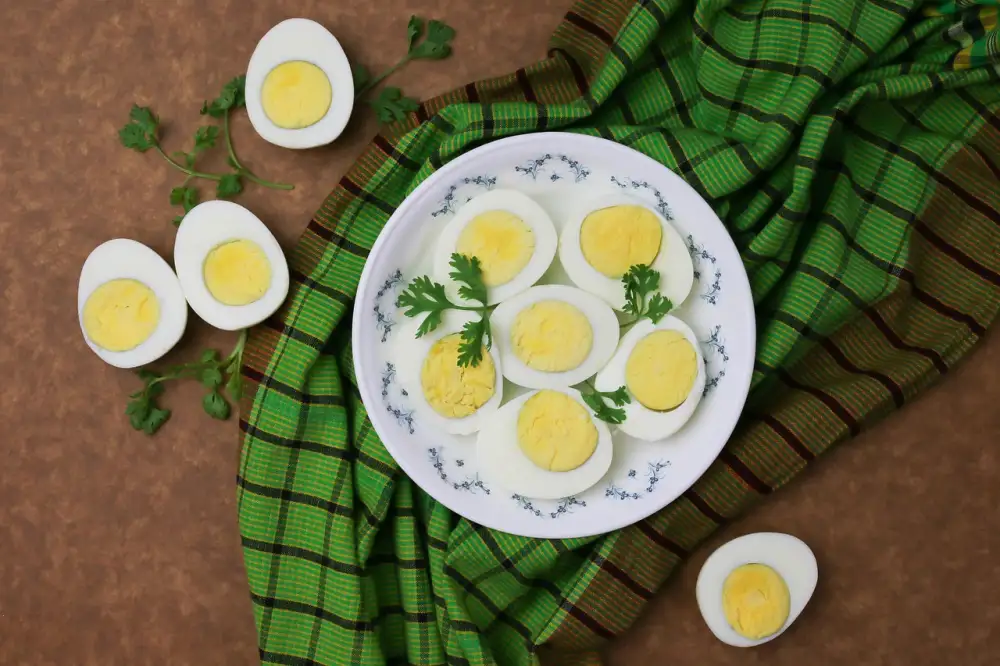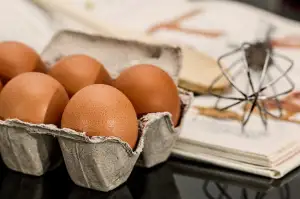Perfectly Boiled Eggs: A Foolproof Recipe for Delightful Hard Boiled Eggs

- Benefits of incorporating hard boiled eggs into your diet
- Step-by-step guide on how to make the perfect hard boiled egg
- Tips for peeling hard boiled eggs easily
- Creative ways to enjoy hard boiled eggs in various dishes
- Nutritional value and health benefits of hard boiled eggs
- Frequently asked questions about hard boiled eggs
Hard boiled eggs are a versatile and nutritious food that can be enjoyed in a variety of ways. They are a popular choice for breakfast, lunch, or as a snack. Hard boiled eggs are made by boiling fresh eggs until the whites are firm and the yolks have reached the desired consistency. They are easy to prepare and can be stored in the refrigerator for several days, making them a convenient option for meal planning. Whether you enjoy them on their own, in salads, or as part of other dishes, hard boiled eggs offer a delicious and satisfying addition to any meal.
Benefits of incorporating hard boiled eggs into your diet
Incorporating hard boiled eggs into your diet offers numerous benefits for your health and well-being. These protein-packed wonders are not only delicious but also provide essential nutrients that support overall health. Here are some key benefits of including hard boiled eggs in your daily meals:
1. High in Protein: Hard boiled eggs are an excellent source of high-quality protein, which is essential for muscle growth, repair, and maintenance. Consuming protein-rich foods like eggs can help you feel fuller for longer and promote healthy weight management.
2. Rich in Vitamins and Minerals: Hard boiled eggs contain a wide range of vitamins and minerals, including vitamin A, vitamin D, vitamin B12, iron, selenium, and choline. These nutrients play vital roles in maintaining healthy bones, promoting brain function, boosting immunity, and supporting cardiovascular health.
3. Low in Calories: With only around 70-80 calories per egg, hard boiled eggs make a nutritious addition to any low-calorie or weight-loss diet plan. They provide a satisfying snack option without adding excessive calories to your daily intake.
4. Heart-Healthy Fats: While hard boiled eggs do contain some fat, the majority is heart-healthy unsaturated fat. These fats can help lower bad cholesterol levels (LDL) and reduce the risk of heart disease when consumed as part of a balanced diet.
5. Versatility: Hard boiled eggs can be enjoyed on their own as a quick snack or incorporated into various dishes such as salads, sandwiches, or breakfast bowls. Their versatility allows you to experiment with different flavors while still reaping the nutritional benefits.
By incorporating hard boiled eggs into your diet regularly, you can enjoy these numerous health benefits while delighting your taste buds with their deliciousness.
Step-by-step guide on how to make the perfect hard boiled egg
1. Place eggs in a single layer in a saucepan or pot. Add enough water to cover the eggs by about an inch.
2. Slowly bring the water to a boil over medium heat. Once boiling, reduce the heat to low and let it simmer for about 9-12 minutes for large eggs.
3. While the eggs are simmering, prepare an ice bath by filling a bowl with cold water and ice cubes.
4. After the desired cooking time, carefully transfer the eggs from the pot to the ice bath using a slotted spoon or tongs.
5. Let the eggs sit in the ice bath for at least 5 minutes to cool and stop further cooking.
6. Gently tap each egg on a hard surface to crack the shell all around, then roll it between your hands to loosen it further.
7. Peel off the shell starting from the wider end of the egg, where there is usually an air pocket that helps with easier peeling.
8. Rinse each peeled egg under cold running water to remove any remaining shell fragments.
Now you have perfectly boiled eggs ready to be enjoyed in various dishes or as a nutritious snack!
Tips for peeling hard boiled eggs easily
Tips for Peeling Hard Boiled Eggs Easily:
Peeling hard boiled eggs can sometimes be a frustrating task, with the shell sticking stubbornly to the egg white. However, with a few simple tips, you can ensure that your hard boiled eggs peel effortlessly every time.
1. Use older eggs: Fresh eggs can be more difficult to peel due to their lower pH levels. It's best to use eggs that are at least one week old for boiling.
2. Add salt or vinegar to the water: Adding a teaspoon of salt or vinegar to the boiling water can help loosen the bond between the egg white and the shell, making it easier to peel.
3. Shock in ice water: After boiling, immediately transfer the eggs to a bowl filled with ice water. This rapid cooling process causes the egg white to contract slightly from the shell, making it easier to peel.
4. Gently tap and roll: Once cooled, gently tap both ends of the egg on a hard surface to create small cracks. Then, roll the egg gently between your hands to further loosen the shell.
5. Peel under running water: Peel the egg under cool running water, as this helps remove any remaining shell fragments and makes peeling easier.
By following these simple tips, you'll be able to enjoy perfectly peeled hard boiled eggs without any hassle or frustration.
Creative ways to enjoy hard boiled eggs in various dishes
Hard boiled eggs are not only delicious on their own, but they can also be used in a variety of creative dishes. Here are some ideas to inspire you:
1. Egg Salad: Mash the boiled eggs with mayonnaise, mustard, and seasonings to create a creamy and flavorful egg salad. Enjoy it as a sandwich filling or as a topping for crackers.
2. Deviled Eggs: Slice the boiled eggs in half, remove the yolks, and mix them with mayonnaise, mustard, and spices. Fill the egg whites with this mixture for a classic appetizer that never fails to impress.
3. Cobb Salad: Add sliced hard boiled eggs to your favorite salad for an extra protein boost. The combination of eggs, bacon, avocado, tomatoes, and blue cheese is simply divine.
4. Ramen Noodles: Upgrade your instant ramen by adding sliced hard boiled eggs on top. The runny yolk adds richness and depth of flavor to the broth.
5. Niçoise Salad: Arrange halved hard boiled eggs alongside tuna, green beans, olives, tomatoes, and potatoes for a refreshing and satisfying French-inspired salad.
6. Scotch Eggs: Wrap hard boiled eggs in sausage meat, coat them in breadcrumbs, and deep fry until golden brown. These crispy delights make for a delightful snack or appetizer.
7. Egg Curry: Simmer peeled hard boiled eggs in a fragrant curry sauce made with spices like turmeric, cumin, coriander, and coconut milk. Serve it over rice or with naan bread for a comforting meal.
Get creative in the kitchen and experiment with different flavors and cuisines to discover even more ways to enjoy the versatility of hard boiled eggs!
Nutritional value and health benefits of hard boiled eggs
Hard boiled eggs are not only delicious but also packed with essential nutrients. They are a great source of high-quality protein, containing all the essential amino acids needed for optimal health. In addition, they are rich in vitamins such as vitamin A, B12, and D, which support immune function and promote healthy skin. Hard boiled eggs also provide minerals like iron and zinc, important for red blood cell production and overall growth. Furthermore, they contain choline, an essential nutrient that plays a vital role in brain development and function. Incorporating hard boiled eggs into your diet can contribute to weight management as they are low in calories and high in satiety-inducing protein. So, enjoy the nutritional benefits of hard boiled eggs while savoring their delightful taste.
Frequently asked questions about hard boiled eggs
1. How long should I boil eggs to achieve a perfect hard boiled consistency?
To achieve a perfectly cooked hard boiled egg, you should boil it for about 9-12 minutes. This will result in a fully cooked yolk with a tender yet firm texture.
2. How can I prevent the greenish-gray ring around the yolk?
The greenish-gray ring around the yolk is caused by overcooking and is harmless but not visually appealing. To prevent this, immediately transfer the boiled eggs to an ice bath after cooking to stop the cooking process.
3. Can I store hard boiled eggs in the refrigerator?
Yes, you can store hard boiled eggs in the refrigerator for up to one week. It's best to keep them in their shells until ready to eat to maintain freshness.
4. Are hard boiled eggs safe for pregnant women and young children?
Hard boiled eggs are generally safe for consumption by pregnant women and young children. However, it's important to ensure that they are properly cooked and stored at appropriate temperatures to reduce the risk of foodborne illnesses.
5. Can I freeze hard boiled eggs?
While it is possible to freeze hard boiled eggs, it is not recommended as freezing can affect their texture and taste. It's best to consume them within a week of boiling.
6. Are brown or white eggs better for boiling?
Both brown and white eggs are equally suitable for boiling. The color of the shell does not affect the taste or nutritional value of the egg.
7. Can I reheat a hard boiled egg?
Yes, you can reheat a hard boiled egg by placing it in hot water or briefly microwaving it on low power. However, be cautious as reheating may cause the yolk to become rubbery.
By addressing these frequently asked questions, we hope we have provided clarity on some common concerns regarding hard boiled eggs. Enjoy experimenting with this versatile and nutritious food!
In conclusion, hard boiled eggs are a versatile and nutritious food that can be enjoyed in various ways. Whether you prefer them as a standalone snack or incorporated into a dish, their simplicity and convenience make them a popular choice for many. With their high protein content and essential nutrients, hard boiled eggs offer numerous health benefits, including improved muscle function and brain health. Additionally, they are an excellent source of vitamins and minerals, such as vitamin B12 and selenium. So next time you're looking for a quick and easy meal option, consider the humble hard boiled egg - a delightful treasure that never fails to satisfy.
Published: 20. 02. 2024
Category: Recipes



